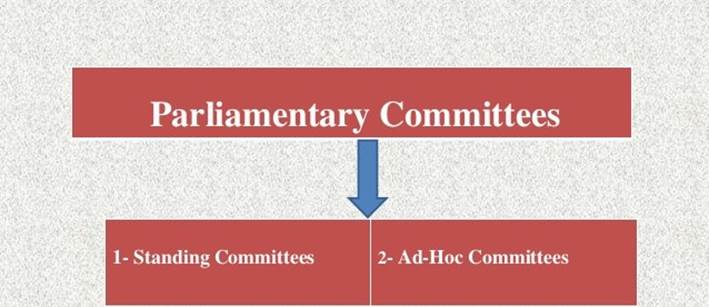Description

Copyright infringement not intended
In News
- Recently a controversy erupted after the announcement of the chairperson for 22 Parliamentary committees, as the main opposition party has the post of chairperson in only one, and the ruling party has the chairmanship of the important committees on Home, Finance, IT, Defense and External Affairs.
Details
● A Parliamentary Committee is a panel of Members of Parliament (MPs) that are appointed or elected by the House or nominated by the Speaker/Chairman and work under the direction of the Speaker/Chairman.
● There are generally two types of legislative committees—standing committees and ad-hoc committees. The former is permanent and operates continuously (constituted each year or periodically) while the latter is temporary and ceases to exist at the end of the mission assigned to them.
Public Accounts Committee
- It was formed in 1921 and is in operation under the provisions of the Government of India Act of 1919.
- It is currently made up of 22 members (15 from the Lok Sabha and 7 from the Rajya Sabha). The representatives have a one-year term of office.
- Every year, the members are elected by the Parliament from among its members using a single transferable vote under the concept of proportional representation.
- A minister cannot be a member of the committee.
- The Speaker appoints the chairman of the committee from among its members.
- The committee's chairman is chosen from the opposition.
- The committee's job is to look over the Comptroller and Auditor General of India's annual audit reports (CAG).
- The committee investigates public spending not just from a legal and formal standpoint to uncover technological anomalies, but also from the standpoints of economy, prudence, wisdom, and propriety to uncover instances of waste, loss, corruption, extravagance, inefficiency, and nugatory expenditures.
- Its proposals are merely suggestions and not binding on the ministries.
Estimates Committee
● The origins of this committee can be traced back to the 1921 establishment of a standing finance committee.
● It has a total of 30 members. The Lok Sabha is represented by all 30 members.
● The Speaker appoints the committee's chairman from among its members, and he is invariably from the governing party.
● Their role is for one year. Every year, it discusses only a few chosen ministries and departments. As a result, it will rotate through all of them over years.
● Its proposals are merely suggestions and do not bind the ministries.
● Its function resembles that of a post-mortem.

Committee on Public Undertakings
● The Krishna Menon Committee recommended that this committee be established in 1964.
● It is made up of 22 people (15 from the Lok Sabha and 7 from the Rajya Sabha).
● Its members are chosen using a single transferable vote under the concept of proportional representation.
● The representatives have a one-year term of office.
● The Speaker appoints the committee's chairman from among its members, who must all be Lok Sabha members.
● They look at the Comptroller and Auditor General's reports on public undertakings.
Departmental Standing Committees
● Departmentally-Related Standing Committees (DRSCs) were formed in Parliament in 1993 on the recommendation of the Lok Sabha Rules Committee.
● The key goal of the standing committees is to ensure that the Executive is more accountable to Parliament, especially in terms of financial transparency.
● The 24 standing committees have authority over all of the Central Government's ministries and departments.
● Each standing committee is made up of 31 people (21 from Lok Sabha and 10 from Rajya Sabha).
● The Rajya Sabha has 8 standing committees, while the Lok Sabha has 16.
● Before they are debated and voted on in the Lok Sabha, they consider the requests for grants made by the relevant ministries and departments.
● Its study does not include any information about cut motions.
● They do not think about the day-to-day operations of the relevant ministries/departments.
https://indianexpress.com/article/explained/explained-politics/parliament-committees-and-their-role-in-law-making-8191768/
https://t.me/+hJqMV1O0se03Njk9













